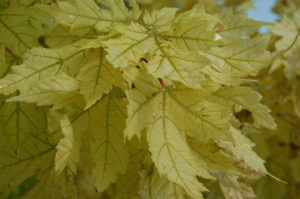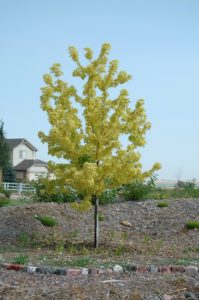Red Maples do not do well in clay soil. Red Oaks, or for that matter, hardly any oaks, do well in clay soil. Birches, Lindens and sugar gums do not do well in clay soil. Yet, as you drive around in Denver you’ll see many beautiful, fully mature red maple and oak trees. They are simply stunning in the fall. But the soil in Denver, is very different than the soil 30 miles north in Brighton. Parts of Brighton is deep sand and the water soaks through like a sieve; and other parts are clay, like my property.
There’s something about clay soil that captures the iron and binds it within the soil, making it unavailable for the plant/tree. I didn’t know that when we bought our first round of trees for the property: 3 red maples, 3 sugar gums, 3 white birches, 2 lindens, and 4 oaks (2 northern red, 1 Shingle and one burr). By the 3rd year (2009) 11 of those first 16 trees were dead or dying from a serious case of iron chlorosis, iron deficiency.


By fall of 2010 the tree south side maples were dead. We pulled them out and planted three more red maples. I REALLY wanted that red on the south berm. We added iron to the soil when they were planted and added iron twice a year in the deep root fertilization. By 2012 they were fading, so we added iron liquid fertilizer to the area around the tree every other month. By 2014, all three were dead, along all the oaks but the Red Northern on the north berm, 1 of the birch trees, and 1 of the sweet gums (however, the sweet gum is alive, but has not grown a single inch in 5 years).
I had to admit defeat. This was a costly lesson. Don’t fight the Mother. She has her ways, and the ways are set.